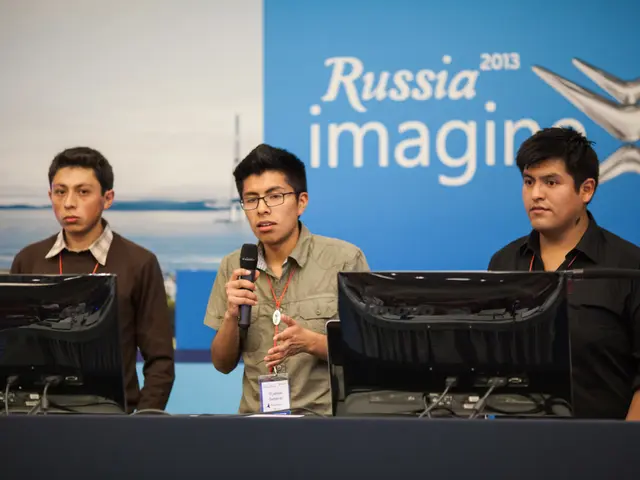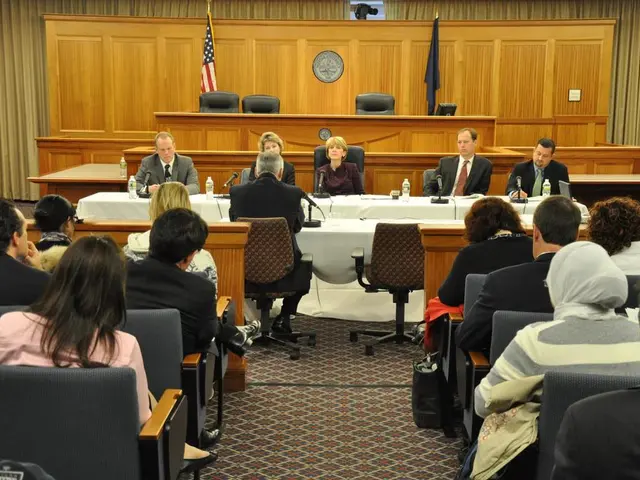Decline in U.S. student visas issued to Indian applicants noticeable, October to March period showing a 44% decrease.
In the first half of fiscal year 2025, the issuance of US F-1 student visas witnessed a significant 15% decline, marking a shift in the landscape of international student mobility[1][3]. This drop can be attributed to a combination of factors, including policy uncertainties, operational setbacks, and geopolitical tensions, particularly affecting large markets like India and China.
One of the primary reasons for this decline is the Trump administration's stricter immigration policies and the resulting uncertainty among prospective students[1][2]. This includes concerns about visa issuance, potential cuts to federal funding for universities, and a harder stance on immigration, such as travel bans, arrests, and specific visa revocations for some Chinese nationals with ties to the Chinese Communist Party[2].
Another significant factor is the operational delays and pauses in visa processing. There was a nearly month-long pause in new visa appointments over May and June 2025, coupled with the introduction of new policies such as screening international students' social media profiles, which further delayed visa issuance and deterred some applicants[1][2].
Tensions between the Trump administration and prestigious US universities, notably Ivy League institutions, also negatively affected international students' enthusiasm about studying in the US[1].
India and China, in particular, experienced a steep decline in F-1 visas issued. India saw a 43.5%–44% decrease, with about 26,000 visas issued in the first half of FY2024 falling to roughly 14,700 visas in the same period of FY2025[1][3]. China, on the other hand, saw a 24.1% drop, with around 11,000 visas issued compared to the previous year[1][3].
However, it's important to note that while some countries, such as India and China, have seen a significant drop in F-1 visa issuances, others like Vietnam, Bangladesh, Pakistan, Colombia, and Zimbabwe have registered strong growth[1][3].
Experts predict a significant risk to US universities and study abroad platforms due to the drop in international student enrollments in India[1]. The pause in new visa appointments may lead to processing bottlenecks, further exacerbating the situation in the second half of fiscal 2025[1].
Despite these challenges, some experts believe that the current drop in enrollments is temporary and will normalize as visa policies return to normal and global mobility increases[1]. Ritika Gupta, CEO of AAera Consultants, shares this view, stating that the US still has the maximum research output, innovations, and direct partnerships with industry, making it an attractive destination for international students[1].
Sources: [1] The PIE News. (2025, May 31). US F-1 student visa issuances declined by 15% in H1 2025. Retrieved from https://www.thepienews.com/news/us-f-1-student-visa-issuances-declined-by-15-in-h1-2025/ [2] Inside Higher Ed. (2025, June 15). Trump Administration's Policies Affect International Student Enrollments. Retrieved from https://www.insidehighered.com/news/2025/06/15/trump-administrations-policies-affect-international-student-enrollments [3] Moody's Investors Service. (2025, July 10). Trump Administration's Restrictions on International Students Increase Financial Risk for Universities. Retrieved from https://www.moodys.com/research/Moodys-Investors-Service-Trump-Administrations-Restrictions-on-International-Students-Increase-Financial--V3_039714
- The decline in F-1 student visa issuances also has implications for finance, as universities may face a financial shortfall due to reduced revenue from international student tuition fees.
- The market for investment in education-and-self-development platforms could be impacted by the drop in international student enrollments, particularly in sectors focused on providing services for students from India and China.
- As the regulatory environment affects the issuance of F-1 student visas, the political landscape is also influenced, as the travel restrictions and visa policies have the potential to complicate diplomatic relations between the US and countries like India and China.
- In the realm of decentralized finance (DeFi), some investors might perceive the drop in F-1 student visas as a general news item, which could potentially impact their investment decisions if they see it as a sign of a broader trend in US-international relations.








